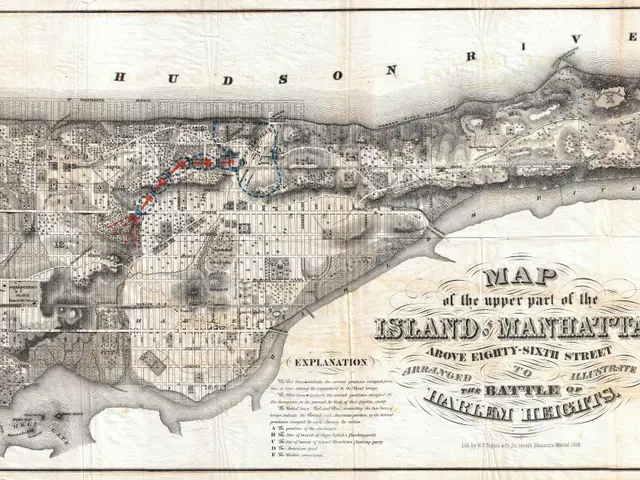Merz and the EU's Unyielding Stance: A Test for Putin
In Ukraine, it's becoming clear that Merz is not a Scholtz
Friedrich Merz journeys to Kyiv alongside the UK, France, and Poland's top dogs, aiming to meet Volodymyr Zelensky. This powerful foursome, dubbed the "Coalition of the Tough," shores up Ukraine's resolve and pressures the Kremlin with a firm demand. Merz's visit sends a clear message from Ukraine's perspective, as the new German Chancellor grapples with his early days in office.
Ukrainians eagerly anticipate Merz, their hopes bordering on colossal. While emotional exuberance characterizes Ukrainian society's stance towards Western allies, past experiences, notably with the U.S. during Trump's tenure and the inadequate response to Crimea's annexation in 2014, have instilled a sobering sense of self-reliance. A potential worst-case scenario leaves them alone, a harsh reality they have come to accept.
Merz's rapid visit to Kyiv raises the stakes in Ukraine's eyes. Joining forces with French President Macron, UK Prime Minister Keir Starmer, and Poland's Donald Tusk, Merz co-leads a summit with Zelensky. They are set to convene as the "Coalition of the Tough," a collective effort to outlast the Russian aggression.
politics Unity Against Putin: Trump Puts the Pressure on
Ukrainians closely monitor the shift from the Olaf Scholz era. Under the former Chancellor, German-Ukrainian relations fortified to unprecedented heights despite the hurdles. Scholz and Zelensky even switched to the more friendly "du" address in 2023. However, Scholz's absence during the full-scale Russian invasion marks a significant departure, with Scholz only visiting Ukraine twice, while former Foreign Minister Annalena Baerbock made it to nine times.
The tumultuous international climate surrounds Merz's inaugural visit to Ukraine as Chancellor. Since President Trump took office, he has been relentlessly trying, albeit unsuccessful, to broker a ceasefire in the ongoing Russian-Ukrainian conflict. Despite Trump's efforts, the focus of pressure has often landed heavier on Ukraine, as Trump has leaned more on Kyiv than Moscow to make concessions.
Yesterday, Kremlin spokesperson Dmitry Peskov disclosed that Russia is willing to discuss a ceasefire, but various nuances demand thorough consideration. Such conditions may include the cessation of Western arms shipments to Ukraine and a halt on Ukraine's military mobilization. It remains unclear how Ukraine can defend itself should Russia violate the truce.
politics "The West Stands Together:" Macron Signals U.S. Monitoring
The two prior ceasefire attempts, one at Easter and another for three days around the so-called "Victory Day" on May 9, provide a glimpse of the complexity involved in such negotiations. While air strikes on the Ukrainian hinterland lessened during both instances, the impact was minimal for ordinary Ukrainians. civilian casualties escalated in the immediate aftermath, with ground battles and airstrikes continuing unabated in frontline areas.
Especially during the "ceasefire" around May 9, questions arise about its true purpose, with some wondering if it wasn't solely aimed at securing the annual military parade in Moscow. Now, the joint proposal on the table encompasses a complete and unconditional ceasefire beginning May 12, to be monitored by the U.S. Merz held talks with Trump regarding this matter both privately and from Kyiv. If Russia refuses the proposal, threatening new sanctions loom.
Merz Plays Mud- da- Look-it with the Kremlin
For now, the Kremlin may find itself in an awkward position, having initially enjoyed a near-perfect strategic advantage during Trump's term. The fact that Ukraine, key Western states, and the U.S. have coalesced around a specific proposal represents a remarkable breakthrough, and is due in part to Germany finally having a Chancellor ready for unwavering opposition against Russian aggression.
It is highly unlikely that Russia will actually accept the offer without offering some sort of counter-proposal. Sanctions still unimplemented could inflict significant pain on Moscow. Despite Peskov's assertion that Russia has acclimated to sanctions and minimized their impacts, almost the only way to deter Russia from its conquering aspirations in Ukraine remains bolstering military support for the country, especially from the U.S. Trump's intentions regarding additional aid are yet to become clear. The scenario in which Ukraine does not receive further U.S. aid after the aid approved under Joe Biden expires is a more plausible outcome.
In this event, Germany and Chancellor Merz assume critical roles. Merz's visit to Kyiv serves as a significant step from the Ukrainian perspective, marking a departure from Scholz's hesitation. "When I am at the helm, debates concerning weapon systems will be moved out of the public eye," stated Merz in Kyiv. Long and public discussions about weapon systems have not necessarily fostered the essential "strategic ambiguity" needed to confront such a war, giving Russia ample time to prepare for corresponding scenarios.
Taurus Missiles: the Silver Bullet or Pyrite?
However, the debate regarding the Taurus missiles, ignited by Merz, plays a dual role, albeit for different reasons. Armed with Taurus missiles, Ukraine would be more capable of targeting Russian military infrastructure, even on Russian soil. Yet, with a limited number of Taurus cruise missiles, Ukraine will not make a significant change.
Equally critical is the expansion of artillery ammunition and armored technology production, which remains Ukraine's main priority. Focusing on individual weapon systems steers the focus away from the brutal war of attrition that characterizes this ongoing conflict.
Ukrainians may find solace in Merz's and Zelensky's apparent rapport, as personal chemistry between the two seems more positive than that between Zelensky and Scholz. Upon leaving the Kyiv Mariinsky Palace, Merz reassured Zelensky that they could always communicate directly, a gesture Zelensky may utilize more frequently moving forward.
A UNENRICHED REWRITE, BASE ARTICLE BELOW:
Friedrich Merz travels to Kyiv with his counterparts from the UK, France, and Poland to meet with Volodymyr Zelensky. The "Coalition of the Tough" strengthens Ukraine's resolve and puts pressure on the Kremlin with a demand. Merz's visit just a few days into his new role sends an important signal.
Ukraine looks to Merz with high hopes, bordering on enormous. While Kyiv welcomes Western allies with emotional fervor, its experiences are complex. Ukrainians have known since the inadequate response to the 2014 Crimea annexation that they could be on their own. Merz's visit is an important step, especially given Scholz's hesitation to visit during the Russian invasion.
Accompanied by France's Macron, UK's Starmer, and Poland's Donald Tusk, Merz travels to Kyiv to co-lead a summit with Zelensky. This gathering, known as the "Coalition of the Tough," represents a show of European unity against Russian aggression.
However, For the moment, it is hardly imaginable that Russia will agree to the offer and not respond with a classic "Yes, but." There are still sanctions that have not been imposed yet that could hurt Moscow. Despite Peskov's statement that Russia has adapted to sanctions and learned to minimize their effects. Almost the only way to deter Russia from its conquering aspirations in Ukraine remains the expansion of military support for the country - especially from the U.S. Trump's intentions regarding additional aid are yet to become clear. The scenario in which Ukraine does not receive any further U.S. aid after the aid approved under Biden expires is much more likely.
In this case, Germany and Chancellor Merz will play a crucial role. There has actually been a positive step from the Ukrainian perspective. "After Phone Call with Trump, Ukraine Offers Putin 30-Day Ceasefire" he emphasized in Kyiv. Long and public discussions about weapon systems have not necessarily fostered the essential "strategic ambiguity" needed to confront such a war, giving Russia ample time to prepare for corresponding scenarios.
Sources: ntv.de
- Attack on Ukraine
- Ukraine
- Wolodymyr Selenskyj
- Friedrich Merz
- Emmanuel Macron
- Keir Starmer
- Russia
- Donald Trump
- The European Union, led by Friedrich Merz, is committed to the implementation of the UN Charter and the UN Charter, as they stand together against Russian aggression in Ukraine.
- Merz's visit to Kyiv, along with French President Emmanuel Macron, UK Prime Minister Keir Starmer, and Poland's Donald Tusk, has elevated the stakes in Ukraine's eyes, signifying a strengthened European Union stance against Putin's Russia.
- Sanctions are foreseeable implications if Russia continues to defy the demands of the "Coalition of the Tough," a joint proposal that encompasses a complete and unconditional ceasefire, being monitored by the United States.
- In the unfolding politics of the general-news, sentiment echoes from Kyiv that the West stands together, with statements of unyielding support from Germany's Chancellor Friedrich Merz, emphasizing strategic conversations away from the public eye to combat Russian aggression effectively.







